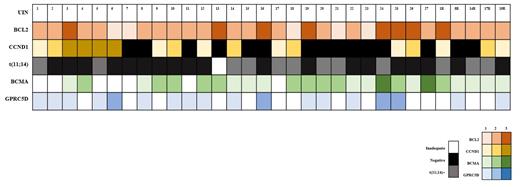Abstract
Introduction
Dysproteinemia refers to a spectrum of gammopathies in which an aberrant clone(s) of late stage B lymphoid cells or plasma cells produces monoclonal immunoglobulins and/or fragments. The spectrum includes incidentally noted benign conditions like monoclonal gammopathy of undetermined significance (MGUS) to life threatening diseases such as multiple myeloma (MM) and systemic light chain (AL) amyloidosis. Exploitation of normal plasma cell biology forms the basis of treatments used in both MM and AL amyloidosis. In recent years, immunotherapeutic strategies targeting plasma cells have redefined the treatment landscape of MM and could be particularly useful in AL amyloidosis which is distinguished by a low burden of less proliferative disease and a paucity of high risk genetics. We sought to characterize the expression of potentially clinically relevant and/or immunotherapeutic targets in amyloidogenic plasma cells.
Methods
All patients diagnosed with systemic AL amyloidosis at Memorial Sloan Kettering Cancer Center, NY between January 1, 2012, and December 31, 2018, who had unstained bone marrow samples were identified. Decalcified formalin fixed paraffin embedded bone marrow biopsy sections were stained for G protein-coupled receptor, class C group 5 member D (GPRC5D), Cyclin D1 (CCND1), B-cell lymphoma 2 (BCL2), and B-cell maturation antigen (BCMA) expression using standard laboratory developed Immunohistochemistry (IHC) assays in a CLIA compliant setting. We scored the biopsies for percentage expression, and intensity of staining. We also obtained the demographic details, staging, and cytogenetic information for the patients from whom these samples were obtained.
Results
During the queried period, 32 unstained samples were available for testing from 27 unique patients. There were 27 diagnostic and 5 patients had additional samples from the time of relapse. The median age was 63 years (range 41-73). 64% of patients were male and 75% had lambda restricted plasma cells. Cytogenetic abnormalities using fluorescence in situ hybridization (FISH) were reviewed, t(11;14) was seen in 38% samples. The median clonal PC burden in BM at diagnosis was 10% (range 2-80%) and 36% had >10% plasma cells. In clonal PCs, the median BCL2 expression was 100% (range 80-100%) with a staining intensity of 2 (range 1-3). 84% (27) samples had BCL2 expression meeting threshold used in the Bellini study. CCND1 expression could be tested in 16 samples median expression 100% (range 20-100%) and median staining intensity 2 (range 1-3). Patients with CCND1 expression also had 100% BCL2 staining. GPRC5D expression was available in 18 samples and all samples tested expressed GPRC5D with median 80% (range 30-100%) with median intensity 1 (range 1-3). BCMA expression was available for 25 samples, with median expression 80% (range 50-100%) with a median staining intensity 2 (range 1-3). Among the five patients with samples from diagnosis and relapse, samples retained their expression of BCL2, BCMA, and GPRC5D. Among samples with t(11;14) by FISH, 92% expressed BCL2 (per Bellini study) and 58% expressed CCND1.
Conclusion
Cell surface expression of novel targets has enabled the development of several efficacious therapeutic strategies in MM. Amyloidogenic plasma cells express GPRC5D, BCMA and BCL2. Our data provides the rationale for careful investigation and development of targeted agents (BCL2 inhibitors, e.g.venetoclax) and immunotherapeutic strategies directed at GPRC5D and BCMA in AL amyloidosis.
Dogan: Roche: Consultancy, Research Funding; Peer View: Honoraria; Seattle Genetics: Consultancy; Takeda: Consultancy, Research Funding; Physicians' Education Resource: Honoraria; EUSA Pharma: Consultancy. Hassoun: Celgene, Takeda, Janssen: Research Funding. Mailankody: Fate Therapeutics: Research Funding; Allogene Therapeutics: Research Funding; Bristol Myers Squibb/Juno: Research Funding; Plexus Communications: Honoraria; Legend Biotech: Consultancy; Evicore: Consultancy; Jansen Oncology: Research Funding; Physician Education Resource: Honoraria; Takeda Oncology: Research Funding. Giralt: SANOFI: Membership on an entity's Board of Directors or advisory committees; AMGEN: Membership on an entity's Board of Directors or advisory committees; JENSENN: Membership on an entity's Board of Directors or advisory committees; GSK: Membership on an entity's Board of Directors or advisory committees; JAZZ: Membership on an entity's Board of Directors or advisory committees; BMS: Membership on an entity's Board of Directors or advisory committees; PFIZER: Membership on an entity's Board of Directors or advisory committees; CELGENE: Membership on an entity's Board of Directors or advisory committees; Actinnum: Membership on an entity's Board of Directors or advisory committees. Landau: Takeda: Research Funding; Genzyme: Honoraria; Takeda, Janssen, Caelum Biosciences, Celgene, Pfizer, Genzyme: Membership on an entity's Board of Directors or advisory committees.


This feature is available to Subscribers Only
Sign In or Create an Account Close Modal